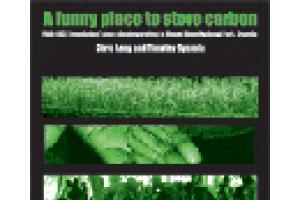In 2003, a committee of the 9th Conference of the Parties (COP 9) to the UN Framework Convention on Climate Change (UNFCCC), held in Milan, established that GE trees could be used within the so called Clean Development Mechanism (CDM) in plantations created to allegedly offset the carbon emissions from factories in the industrialized North.
Large-Scale Tree Plantations
Industrial tree plantations are large-scale, intensively managed, even-aged monocultures, involving vast areas of fertile land under the control of plantation companies. Management of plantations involves the use of huge amounts of water as well as agrochemicals—which harm humans, and plants and animals in the plantations and surrounding areas.
Bulletin articles
29 December 2006
Other information
29 December 2006
Peru is one of the few South American countries where large scale monoculture tree plantations have not yet been introduced; however the government is seeking to promote their expansion. In fact the country already has a “2005-2024 National Reforestation Plan” [National Plan] and also a “Law for the promotion of private investment in afforestation and/or reforestation” [Forestation Law], the basic tools to make tree plantations justifiable and feasible.
Other information
29 December 2006
Today [December 12], hundreds of indigenous people from the seven Tupinikim and Guarani communities in the state of Espirito Santo, Brazil, occupied the harbor Portocel, from where the cellulose of the company Aracruz Celulose is being exported to Europe, the USA and Asia.
Other information
29 December 2006
In response to timber industry efforts to expand the area of land under industrial timber plantations by 600,000 hectares, a Plantations Campaign was started by a small group of NGOs in South Africa in 1995.
Other information
29 December 2006
“All villagers understand the need to protect the forest. We can't live without it.” The speaker is a villager from Dak Dam Commune in Mondulkiri province in the north-east of Cambodia. “Now our life is more difficult,” he said.
Other information
29 December 2006
In July 2004, a business delegation from the Vietnam General Rubber Corporation visited Laos. At the time only a small area was planted with rubber in the south of Laos. “We can provide 50,000-100,000 hectares of land for Vietnam to grow rubber,” Thongloun Sisolit, the Lao Deputy Prime Minister, told the delegation.
Other information
29 December 2006
It is almost certain that the Finnish public know little or nothing about Uruguayan history and on how this history relates to the current Metsa Botnia pulp mill project in this country. It is therefore important to explain that a military dictatorship ruled Uruguay from 1973 to 1984. During that period the military violated every possible human right and torture was common practice during those years. Thousands of Uruguayans –men and women- were tortured and imprisoned; scores of people were killed and “disappeared” and thousands had to live in exile during that period.
Publications
22 December 2006
By Chris Lang and Timothy Byakola
Bulletin articles
30 November 2006
The US Department of Energy's Office of Biological and Environmental Research (DOE) is funding a $1.4 million, three-year study by Purdue faculty members to determine ways to alter lignin and test whether the genetic changes affect the quality of plants used to produce biofuels. A hybrid poplar tree is the basis for the research that is part of the DOE's goal to replace 30 percent of the fossil fuel used annually in the United States for transportation with biofuels by 2030.
Other information
30 November 2006
In Brazil, production through agriculture of a new energy model is present every day in the mass media and increasingly the development of this field is gaining social endorsement and economic justification. Rapidly, the use of land to produce food is sharing its space with the fuel production. This change in social perception is very evident in the repeated news features showing farmers and landowners as the new “oil field” owners.
Other information
30 November 2006
In Cameroon, like in other African countries such as Ivory Coast or Ghana, the production of oil palm is distributed in 3 sectors: an agro-industrial sector, a village sector controlled by agro-industries, and a small-scale traditional sector.
Even though Indonesia and Malaysia hold a strong leadership position in the oil palm global market, the agro-industrial sector in Cameroon can rely on several advantages.
Other information
30 November 2006
The Western world, and in particular the countries of the North, gave in to addiction to fossil fuels. This path has led to something that today nobody can doubt: climate change. Many solutions have been put forth to face it, but most of them let humanity’s race towards suicide continue as vigorously as before.

